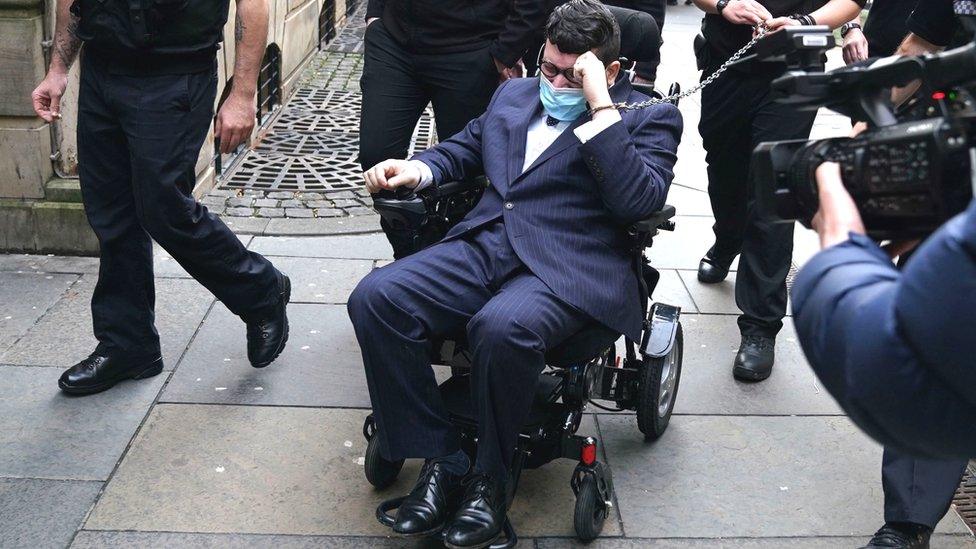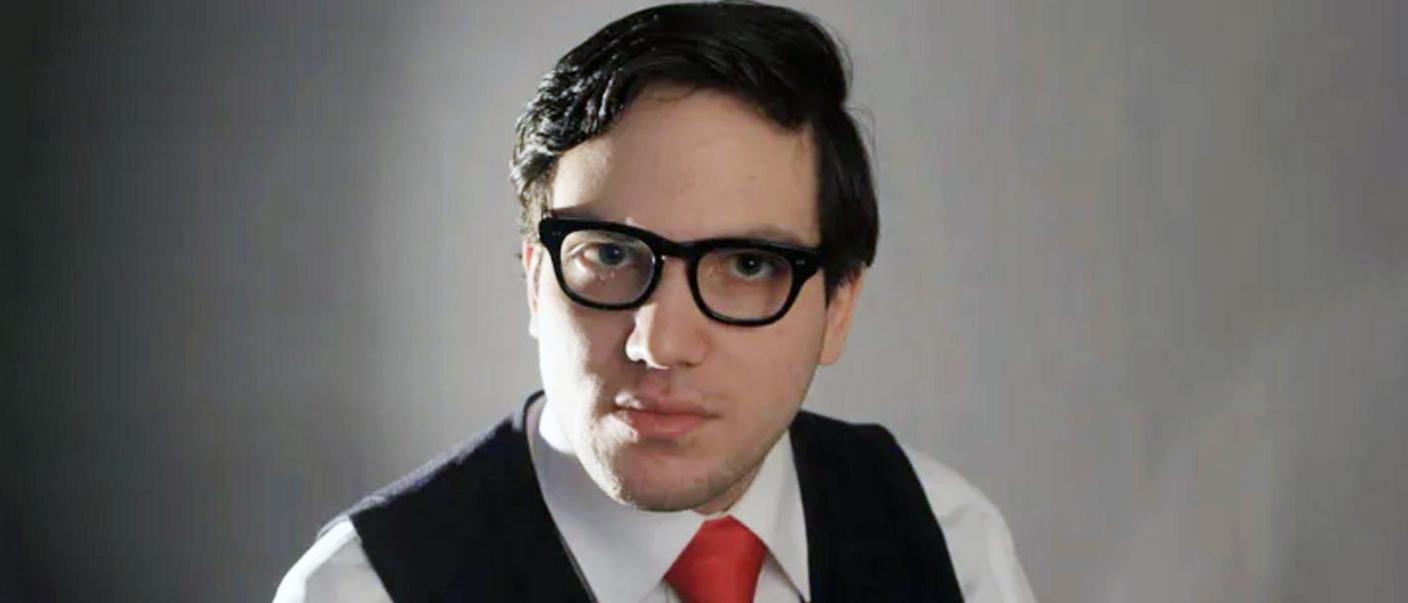Nicholas Rossi: Alleged fugitive says he was tattooed in hospital
- Published

The man who calls himself Arthur Knight arrives at court, chained to a custody officer
A man who denies being a US fugitive who is wanted over a rape charge has claimed he was tattooed while lying unconscious in hospital.
A court is trying to determine whether the man, who claims to be called Arthur Knight, is actually Nicholas Rossi.
Witnesses said he had distinctive tattoos on his arm similar to Mr Rossi.
But the man said he did not have tattoos until he spent time in the Queen Elizabeth University Hospital in Glasgow.
He had checked himself into the hospital under the name of Arthur Knight in October of last year after contracting Covid.
Police Scotland officers arrested him after receiving an Interpol red notice showing Mr Rossi's face and tattoos.
Mr Rossi is wanted by authorities in the US in connection with the rape of a student in Utah and for attacks on other women.
They believe the man who calls himself Mr Knight is really Mr Rossi, and are seeking his extradition from Scotland.
The images of Mr Rossi's tattoos were recognised by medical staff at the QEUH as being similar to those on the arm of the man claiming to be Mr Knight.
But the man told the court: "Throughout the 18 days I was comatosed, I did not have free will over my body. I have never had tattoos prior to being in hospital."
Advocate depute Paul Harvey asked him to clarify if the tattoos appeared on his body while he was in a coma, to which he replied: "Yes" and that he "raised it with the hospital administration".
The man added: "They were put there to make it look like I am this Nicholas Rossi.
"All I can say is that when I awoke from the coma, there were tattoos on my person and they were not identical to what appears on these screens."
'Distinctive tattoos'
Charge nurse Ruth Keating, 58, who cared for the man while he was in hospital, had earlier described how the patient had "distinctive" tattoos on both arms.
After being shown one particular photo on the Interpol red notice of Mr Rossi, which showed a tattoo of a red cross above an angel wing, Ms Keating said: "That looks like the tattoo I saw on Arthur Knight."
The two police constables who arrested the man, Shannon McGill and Jamie Crombie, also told the court they saw tattoos similar to Mr Rossi's on his arms.
The court heard from a fingerprint expert on Monday who said prints taken from the man by police in HMP Saughton in July were "identical" to Mr Rossi's fingerprints on the Interpol red notice and a subsequent extradition request from the US.
On Tuesday, another Tenprint Identification Officer, Anita Vezza, said she had also compared the man's fingerprints with those of Mr Rossi and had found that "there were similar characteristics on each that were unique to that person".

Nicholas Rossi is wanted by authorities in Utah over rape and sexual assault charges
But the man said the fingerprints on the extradition request (those of Rossi) had been meddled with, and taken from him by an NHS worker called "Patrick" on behalf of David Leavitt, a Utah County attorney.
Mr Harvey put it to the man: "Your evidence is that the Utah authorities have lied to this court about how they obtained the fingerprints?"
He replied: "Yes."
When asked if the headshots of Mr Rossi on the Interpol red notice and extradition request were him, the man said the images has been transposed by Mr Leavitt.
He told the court there were "elements" of his appearance that were similar, but the eyes were too far apart, the nose too fat and the face too wide for it to be him.
The man's marriage certificate was then shown to the court, which had been signed under the name Nicholas Brown and which said his father was "unknown".
Accent switched
But a medical form was then shown, also signed as Nicholas Brown, which said his father had died of a heart attack in his 30s.
The man disputed the latter document, saying the writing on the form was not his.
Asked why his accent switched from posh English to other accents during the hearing, the man blamed oxygen deprivation.
His wife, Miranda Knight, 41, was also called to give evidence.
She told the court the reason for his name changes was because he suffered post traumatic stress disorder (PTSD) from his childhood.
Mrs Knight said: "Nicholas Brown had bad connotations for him.
"We discussed with our vicar what he had been through so we thought adopting his middle name would help take away those connotations... and adopting (the name) Arthur Knight would be good for his health."
Mungo Bovey KC, defending the man, asked the witness if there was any indication her husband was Mr Rossi, to which she replied: "No."
Sheriff Norman McFadyen adjourned the hearing until Wednesday morning.